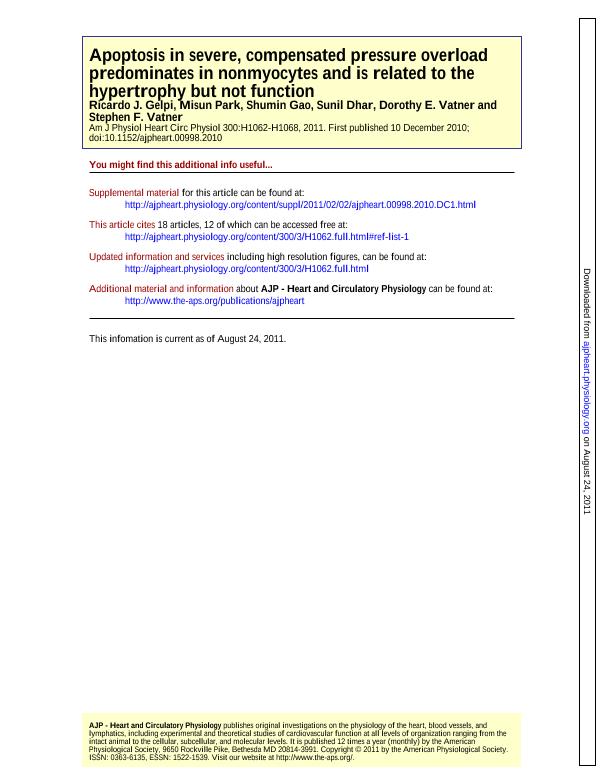Mostrar el registro sencillo del ítem
dc.contributor.author
Gelpi, Ricardo Jorge

dc.contributor.author
Park, Misun
dc.contributor.author
Gao, Shumin
dc.contributor.author
Dhar, Sunil
dc.contributor.author
Vatner, Dorothy E.
dc.contributor.author
Vatner, Stephen F.
dc.date.available
2022-02-08T11:01:50Z
dc.date.issued
2011-03
dc.identifier.citation
Gelpi, Ricardo Jorge; Park, Misun; Gao, Shumin; Dhar, Sunil; Vatner, Dorothy E.; et al.; Apoptosis in severe, compensated pressure overload predominates in nonmyocytes and is related to the hypertrophy but not function; American Physiological Society; American Journal of Physiology - Heart and Circulatory Physiology; 300; 3; 3-2011; 1062-1068
dc.identifier.issn
0363-6135
dc.identifier.uri
http://hdl.handle.net/11336/151546
dc.description.abstract
It is widely held that myocyte apoptosis in left ventricular hypertrophy (LVH) contributes to left ventricle (LV) dysfunction and heart failure. The main goal of this investigation was to determine if there is a statistical relationship among LV hypertrophy, apoptosis and LV function, and importantly whether the apoptosis occurs in myocytes or nonmyocytes in the heart. We used both rat and canine models of severe LVH induced by chronic thoracic aortic banding with resultant LV-aortic pressure gradients 145-155 mmHg and increases in LV/body weight of 58 and 70%. These models also provided the ability to examine transmural apoptosis in LVH. In both models, the overwhelming majority (88%) of apoptotic cells were nonmyocytes. The regressions for apoptosis vs. LVH were stronger for nonmyocytes than myocytes and also stronger in the subendocardium than the subepicardium. Importantly, LV systolic and diastolic wall stresses were normal, indicating that the apoptosis could not be attributed to LV stretch or heart failure. In addition, there was no relationship between the extent of apoptosis and LV ejection fraction, which actually increased (P < 0.05), in the face of elevated LV systolic pressure, indicating that greater apoptosis did not result in a decrease in LV function. Thus, in response to chronic, severe pressure overload, LVH in the absence of LV dilation, and elevated LV wall stress, apoptosis occurred predominantly in nonmyocytes in the myocardial interstitium, more in the subendocardium than the subepicardium. The extent of apoptosis was linearly related to the amount of LV hypertrophy, but not to LV function.
dc.format
application/pdf
dc.language.iso
eng
dc.publisher
American Physiological Society

dc.rights
info:eu-repo/semantics/openAccess
dc.rights.uri
https://creativecommons.org/licenses/by/2.5/ar/
dc.subject
HEART FAILURE
dc.subject
LEFT VENTRICULAR HYPERTROPHY
dc.subject
LEFT VENTRICULAR WALL STRESS
dc.subject
PROGRAMMED CELL DEATH
dc.subject.classification
Otras Ciencias de la Salud

dc.subject.classification
Ciencias de la Salud

dc.subject.classification
CIENCIAS MÉDICAS Y DE LA SALUD

dc.title
Apoptosis in severe, compensated pressure overload predominates in nonmyocytes and is related to the hypertrophy but not function
dc.type
info:eu-repo/semantics/article
dc.type
info:ar-repo/semantics/artículo
dc.type
info:eu-repo/semantics/publishedVersion
dc.date.updated
2020-04-01T18:04:50Z
dc.journal.volume
300
dc.journal.number
3
dc.journal.pagination
1062-1068
dc.journal.pais
Estados Unidos

dc.journal.ciudad
Bethesda
dc.description.fil
Fil: Gelpi, Ricardo Jorge. Consejo Nacional de Investigaciones Científicas y Técnicas. Oficina de Coordinación Administrativa Houssay. Instituto de Bioquímica y Medicina Molecular. Universidad de Buenos Aires. Facultad Medicina. Instituto de Bioquímica y Medicina Molecular; Argentina
dc.description.fil
Fil: Park, Misun. No especifíca;
dc.description.fil
Fil: Gao, Shumin. No especifíca;
dc.description.fil
Fil: Dhar, Sunil. No especifíca;
dc.description.fil
Fil: Vatner, Dorothy E.. No especifíca;
dc.description.fil
Fil: Vatner, Stephen F.. No especifíca;
dc.journal.title
American Journal of Physiology - Heart and Circulatory Physiology

dc.relation.alternativeid
info:eu-repo/semantics/altIdentifier/url/https://journals.physiology.org/doi/full/10.1152/ajpheart.00998.2010?rfr_dat=cr_pub++0pubmed&url_ver=Z39.88-2003&rfr_id=ori%3Arid%3Acrossref.org
dc.relation.alternativeid
info:eu-repo/semantics/altIdentifier/doi/http://dx.doi.org/10.1152/ajpheart.00998.2010
Archivos asociados
